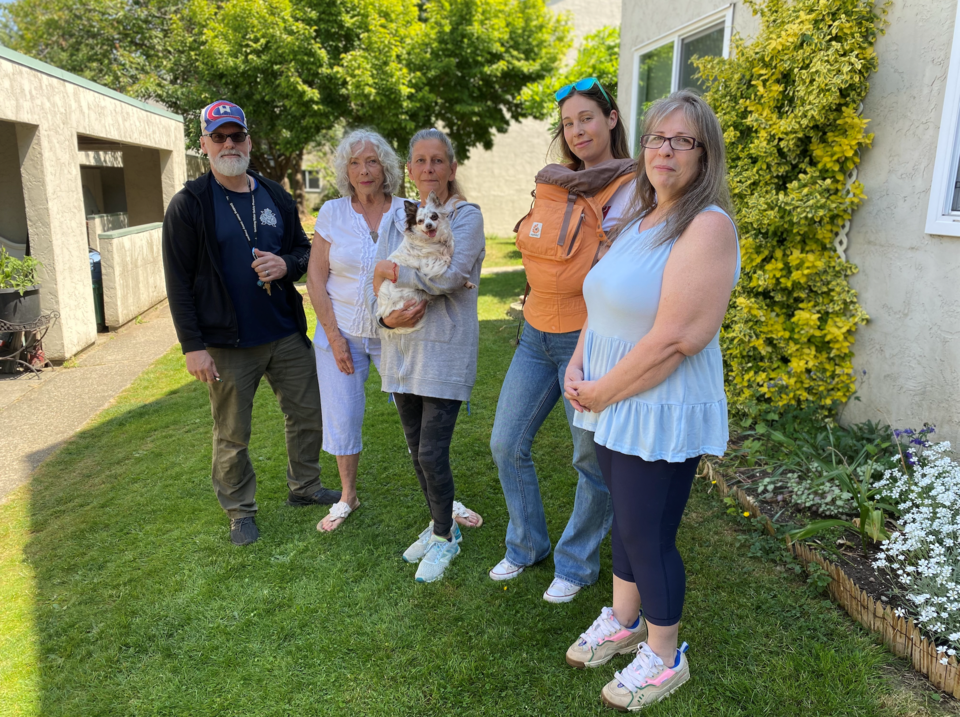Fifty-eight families and individuals are facing eviction if they don't soon agree to close to a tripling of their monthly rents after their housing co-operative failed to secure a deal on the land it was built on — a rare occurrence in B.C.
"I'm looking for everything and anything. But we have a small dog, which narrows 90 per cent of the places we might be able to afford, albeit not eat very well," 60-year-old Dayna White explained of her ongoing search for housing.
"I'm looking at PadMapper, Marketplace, REW, and we're looking from here to Mission and Abbotsford, all the areas. …But there is nothing affordable," said White, who lives off a low income due to a disability with her husband, a delivery driver.
For 40 years, Totem Co-op had largely sheltered its members from Metro Vancouver's rising housing costs. The co-op was established in 1982 and, according to former board member and resident Judy Patka, obtained a dirt cheap 40-year leasehold for about $4,000 from a pension fund until December 2022. The co-op then built 58 townhouse units, and in 2017, it fully paid its mortgage on the buildings.
With the building mortgage gone, Patka told Glacier Media a deal was in reach for the co-op to buy the land for about $6.5 million in 2017; however, to her frustration, a majority of members voted against it, as the new mortgage would have raised monthly rates a few hundred dollars.
In 2022, some co-op members were interested in trying to buy the land. Still, a deal was never struck, leading to the lease's expiration and a temporary six-month extension to July 1 for $65,000 per month, plus utilities, taxes and maintenance.
Patka said the co-op has provided a "nice sense of community."
"There's a little common area where we used to have happy hours. Kids would play here; there's a little playground there; there's lovely gardens in the back. I mean, where are you going to find that?" said Patka.
During the lease, White paid $850 for a two-bedroom unit while a one-bedroom unit went for about $650, said Patka.
The relatively low cost set by members had been a double-edged sword, said Patka, noting the units themselves are beginning to show significant wear and tear due to a lack of investment.
But the affordability has allowed people to get by, including Patka, who lives off a low income of $2,100.
Colette Coulter and her husband, who are raising three young children and completing further post-secondary education, said her family's only option appears to be to move back in with her parents.
Coulter said her father, a developer, offered to buy the land last year for about $10.5 million, plus provide each tenant $50,000 with a two-year notice to vacate.
But the landowner chose a better deal in the end.
The land was sold by Four Local Pension Asset Holding Society, which is held by the CSW Medical Plan & BC Labourers Pension Plan, serving Local 1611 of the 500,000-member Laborers' International Union of North America.
The buyer is Munish Katyal, the principal of KVA Developments Ltd. in Surrey and a former director of Indo-Canadian Voice, an online local news publication.
Katyal paid $15.5 million cash for the land on March 29 and sent a letter informing tenants of new rates as of July 1: $1,600 for a one-bedroom, $2,100 for a two-bedroom, and $2,750 for a three-bedroom.
Based on the rate proposal sheet tenants received, the monthly revenues would be roughly double the monthly payment for a $15.5-million 30-year loan — with a 20 per cent down payment — at a five per cent interest rate.
Tenants Glacier Media spoke to on June 1 said they have not received any formal notices, and Katyal, who declined to comment when reached by phone at his business, has not inspected the units.
"When the new owner says the co-op has to leave, there's nothing the members can do about it. It's a strange thing, and very seldom does this happen," said the co-op's lawyer Geoffrey Dabbs, who pitched an extension of the six-month lease terms to Katyal, who refused.
"It will still be a co-op; it just won't have any assets. The co-op has to leave, so whether individuals squat, that's their call, but I'm not representing them," said Dabbs.
According to Thom Armstrong, CEO of the Co-operative Housing Federation of B.C. (CHFBC), which represents 96 per cent of the 270 co-ops in B.C., Totem Co-op is one of only eight co-ops on private land. Otherwise, 190 own their land, 50 are owned by the City of Vancouver, the Canadian Mortgage Housing Corporation owns 22, and trusts own the remaining.
"If anything, there's the good news, this is a very rare instance," said Armstrong, who said allowing an institutional investor to lease the co-op was "a bad idea to begin with."
Armstrong said the CHFBC tried to assist Totem Co-op with its purchase attempt in 2017 via a loan; however, the co-op declined in a vote. Instead, the members chose to lower their rents, representing the tension co-ops face between short-term affordability and long-term viability.
"It's awkward for me. We spend 99 per cent of our time defending decisions co-ops make," said Armstrong, noting co-ops are subject to the same financial pressures of owners of private rental apartments.



